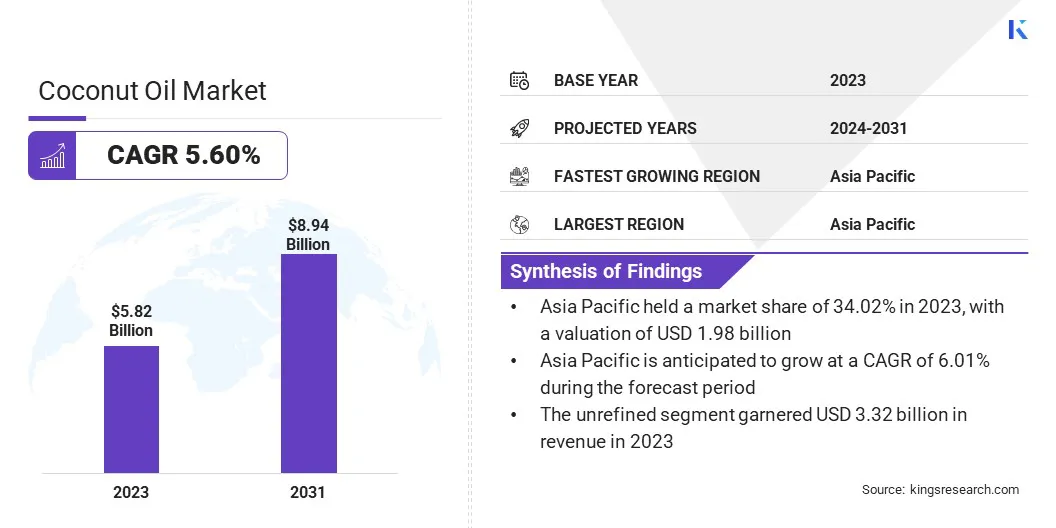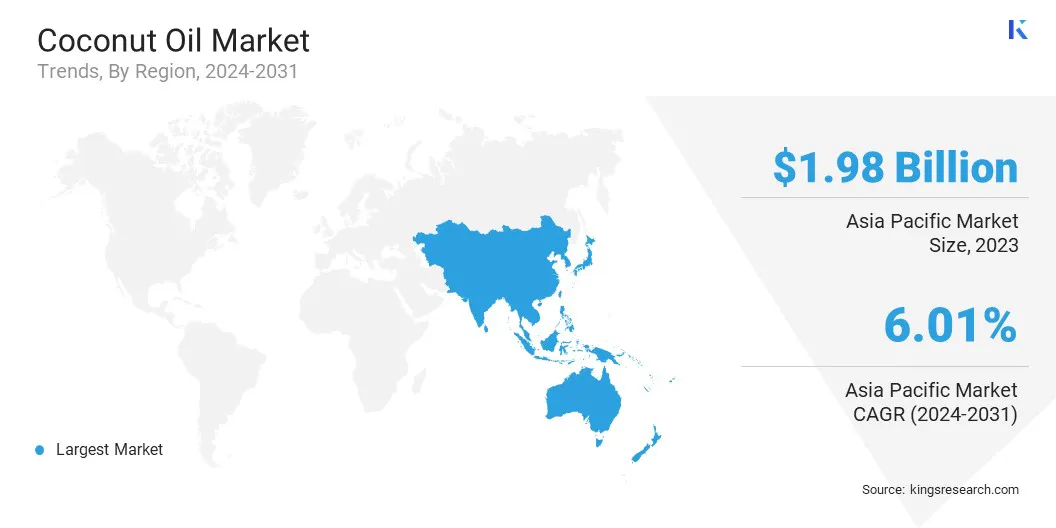Market Definition
The coconut oil market involves the extraction and processing of oil from coconuts, primarily through two main processes: dry and wet processing. In dry processing, dried coconut meat (copra) is mmechanically pressed to extract oil.
In contrast, wet processing involves the cold-press extraction of oil directly from fresh coconut meat, preserving more natural nutrients. Both processes produce high-quality coconut oil, which is utilised in a wide range of applications in cooking, cosmetics, and health products.
Coconut Oil Market Overview
Global coconut oil market size was valued at USD 5.82 billion in 2023, which is estimated to be valued at USD 6.11 billion in 2024 and reach USD 8.94 billion by 2031, growing at a CAGR of 5.60% from 2024 to 2031.
This growth is driven by increasing consumer awareness of coconut oil’s health benefits, including its potential to improve cholesterol levels, support weight management, and enhance skin health.
Major companies operating in the global Coconut Oil industry are Cargill, Incorporated, Mangga Dua, Greenville Agro Corporation, Roycefood Corporation, Novel Nutrientss Pvt Ltd., Aromaaz International, Adams Vision SRL, ConnOils By Kraft, Tantuco Enterprises, Inc., Celebes Coconut Corporation., Green Enterprises Pte Ltd, SUN BIONATURALS (INDIA) PRIVATE LTD, Bo International, Marico, and Rmayra Naturals.
The market is a significant segment of the global oils and fats industry, driven by growing demand for natural, nutrient-rich, and multi-purpose products. As consumers increasingly seek alternatives to synthetic oils, coconut oil's popularity continues to rise, particularly in tropical regions with established tropical agriculture.
- In November 2024, The Cannabist Company partnered with Veda Warrior, an Ayurvedic wellness brand, to introduce cannabis-infused holistic products, including coconut oil in New Jersey.

Key Highlights:
- The global coconut oil market size was recorded at USD 5.82 billion in 2023.
- The market is projected to grow at a CAGR of 5.60% from 2024 to 2031.
- Asia Pacific held a market share of 34.02% in 2023, with a valuation of USD 1.98 billion.
- The unrefined segment garnered USD 3.32 billion in revenue in 2023.
- The food & beverages segment is expected to reach USD 44 billion by 2031.
- Europe is anticipated to grow at a CAGR of 5.62% during the forecast period.
Market Driver
"Versatility in Cooking"
Coconut oil’s culinary versatility is a major driver of market growth, particularly with the rising demand of plant-based and nutritious foods. Its high smoke point makes it suitable for various cooking methods like frying, sauteing, and baking.
Coconut oil is widely used in plant-based and whole-food diets for its health benefits and natural origin. As consumers increasingly prioritize healthier, sustainable cooking alternatives, coconut oil is becoming a preferred choice for both home kitchens and commercial food producers, driving steady growth across global markets.
- In May 2024, Tata Consumer Products launched a premium range of cold-pressed oils in India under its Tata Simply Better brand. This range includes virgin cold-press coconut oil that preserve natural flavor, nutrients, and antioxidants.
Market Challenge
"Competition from Alternatives"
The coconut oil market faces growing competition from cheaper alternatives like palm and soybean oils, alongside sustainability concerns linked to coconut farming. Environmental issues, such as deforestation, and labor shortages in key producing regions like the Philippines and Indonesia, strain production.
To remain competitive, companies must focus on sustainable practices, adopt certifications like Fair Trade, and invest in agricultural innovation. Promoting coconut oil's health benefits and exploring new markets can also help differentiate it from alternatives.
Market Trend
"Growing Use in Personal Care"
The use of coconut oil in personal care products has surged, driven by its natural moisturizing and anti-inflammatory properties. It is increasingly incorporated into skincare and haircare formulations like lotions, creams, shampoos, and conditioners.
Its effectiveness in nourishing skin, promoting healthy hair, and reducing inflammation has made it a preferred ingredient for both premium and mass-market cosmetic brands. The shift toward, clean, plant-based beauty products,has further elevated coconut oil’s role as a versatile and sustainable component in cosmetic formulations.
- In April 2024, Naples Soap Company launched the Grow Beautii line, catering to the growing demand for sensitive skincare products. This new range features ingredients like coconut oil targeting consumers seeking gentle and affordable beauty solutions for sensitive skin.
Coconut Oil Market Report Snapshot
|
Segmentation
|
Details
|
|
By Type
|
Refined, Unrefined
|
|
By Application
|
Food & Beverages, Pharmaceuticals, Cosmetic & Personal Care
|
|
By Region
|
North America: U.S., Canada, Mexico
|
|
Europe: France, UK, Spain, Germany, Italy, Russia, Rest of Europe
|
|
Asia-Pacific: China, Japan, India, Australia, ASEAN, South Korea, Rest of Asia-Pacific
|
|
Middle East & Africa: Turkey, UAE, Saudi Arabia, South Africa, Rest of Middle East & Africa
|
|
South America: Brazil, Argentina, Rest of South America
|
Market Segmentation:
- By Type (Refined, Unrefined): The Unrefined segment earned USD 3.32 billion in 2023 due to its nutritional benefits, appealing to health-conscious consumers seeking natural options.
- By Application (Food & Beverages, Pharmaceuticals, Cosmetic & Personal Care): The Food & Beverages segment held 38.45% of the market in 2023, due to coconut oil’s health benefits and increasing use in organic and health-focused foods.
Coconut Oil Market Regional Analysis
Based on region, the global market has been classified into North America, Europe, Asia Pacific, Middle East & Africa, and Latin America.

Asia Pacific's coconut oil market share stood at around 34.02% in 2023, valued at USD 1.98 billion. The region dominates the global market due to large-scale coconut production in countries like the Philippines, Indonesia, and India. This abundant supply supports extensive use in cooking, personal care, and healthcare.
Additionally, rising demand for natural and organic products further strengthens Asia Pacific’s position as a key player in the global coconut oil industry. The International Coconut Conference (ICCO 2024), held in Bangkok, highlighted innovative strategies for production and market expansion, driving increased collaboration and growth in the region's coconut oil sector.
Europe coconut oil industry is projected to grow at a CAGR of 5.62% over the forecast period. iThe region’s rapid growth is fueled by increasing consumer preference for natural, organic and plant-based alternatives.
The shift toward healthy living and clean beauty has led to a surge in coconut oil consumption in food, skincare, and hair care. Countries like Germany, the UK, and France are leading this trend, with consumers seeking versatile, nutrient-rich ingredients, in turn driving the growth of the market in this region.
Regulatory Frameworks
- In U.S., the Food and Drug Administration (FDA) is responsible for protecting the public health by assuring the safety, efficacy, and security of human and veterinary drugs, biological products, medical devices, food supply, cosmetics, and products that emit radiation. The FDA also provides accurate, science-based health information to the public.
- In India, the Food Safety and Standards Authority of India (FSSAI) regulates food-grade coconut oil production, ensuring quality and hygiene standards.
Competitive Landscape:
Acquisitions in the coconut oil market have become a strategic move for companies looking to expand their product portfolios and strengthen their market position.
Companies are acquiring smaller brands to gain access to new markets, enhance innovation, and diversify their offerings, especially in health and wellness sectors. Such acquisitions also allow firms to leverage existing distribution networks and boost overall market share in the growing demand for coconut-based products.
- In February 2025, Bajaj Consumer Care acquired Vishal Personal Care, producer of an Ayurvedic coconut oil brand called Banjara. This acquisition enhances its market presence, especially in South India, and allows Bajaj Consumer Care to expand into new regions.
List of Key Companies in Coconut Oil Market:
- Cargill, Incorporated
- Mangga Dua
- Greenville Agro Corporation
- Roycefood Corporation
- Novel Nutrientss Pvt Ltd.
- Aromaaz International
- Adams Vision SRL
- ConnOils By Kraft
- Tantuco Enterprises, Inc.
- Celebes Coconut Corporation.
- Green Enterprises Pte Ltd
- SUN BIONATURALS (INDIA) PRIVATE LTD
- Bo International
- Marico
- Rmayra Naturals
Recent Developments (M&A)
- In January 2025, Edible Garden AG signed a non-binding letter of intent (LOI) to acquire Narayan Group, a producer of organic coconut products. The deal will involve issuing shares of Edible Garden’s stock in exchange for Narayan’s entire share capital, strengthening Edible Garden’s position in the market.


